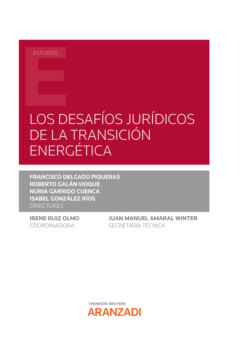Читать книгу Los Desafíos Jurídicos de la Transición Energética - Isabel González Ríos - Страница 62
На сайте Литреса книга снята с продажи.
II. THE EU’S GOALS AND COMPETENCES REGARDING THE INTERCONNECTION AND INTEROPERABILITY OF NETWORKS
ОглавлениеThe expansion of energy networks is not only a goal of individual Member States but also of the European Union, which has special powers in this area, granted in 2009, when Art 194 (1) TFEU was incorporated into the TFEU by the Treaty of Lisbon. This treaty article provides that the EU shall pursue four objectives in its energy policy in a spirit of solidarity between Member States and within the framework of the establishment or functioning of the internal market and having regard to the need to preserve and improve the environment. These four energy policy objectives are to:
• ensure the functioning of the energy market;
• ensure the security of energy supply in the Union;
• promote energy efficiency and energy saving and the development of new and renewable forms of energy; and
• promote the interconnection of energy networks.
“Interconnection of energy networks” directly relates to improving the linkages between existing networks. This includes not only the technical implementation of interconnections, i.e., the interoperability of the various network systems but also relates to the expanding of grids, i.e. the construction of new power lines.
Indeed, when viewed holistically, this fourth goal is a prerequisite for the first two goals. If the Member States’ networks are not effectively interconnected, a cross-border electricity market and Union-wide security of the electricity supply cannot be guaranteed. With regard to the third objective concerning the development of renewable energy sources, interconnectivity will become increasingly essential with the passage of time, as has been previously stated.
Art 194 (1) (d) TFEU must be read in the context of Art 170 to Art 172 TFEU regarding the EU’s competences for the development of European energy networks. Accordingly, the Union shall contribute to the establishment and development of trans-European networks in the areas of transport, telecommunications and energy infrastructure. The treaty mentions five broad reasons why the EU hold competence in this area, namely:
• To contribute to the achievement of the objectives of the internal market (Art 170 (1) and Art 26 TFEU);
• To strengthen the EU’s economic, social and territorial cohesion, to promote its overall harmonious development (Art 174 (1) TFEU).
• To reduce disparities between the levels of development of the various regions and the backwardness of the least favoured regions (Art 174 (2) TFEU);
• To enable citizens of the Union, economic operators and regional and local communities to derive full benefit from the setting-up of an area without internal frontiers (Art 170 (1) AEUV);
• To this end, the Union’s action within the framework of a system of open and competitive markets shall aim to promote the interconnection and interoperability of national networks as well as access to such networks. It shall take particular account of the need to connect insular, landlocked and peripheral regions with the central regions of the Union (Art 170 (2) TFEU).
Even one readily accepts that the establishment and development of trans-European networks fall under the competences of the EU as provided in Art 4 (2) (h) TFEU, the different scopes of Art 170 and 171 TFEU as well as Art 194 (1) (d) TFEU are of importance.
To begin with, the scope of Art 170 (1) TFEU is limited. According to this provision, the Union may only contribute to the establishment and development of trans-European networks and according to Art 171 TFEU, the Union may only take certain measures, namely:
• It may draw up guidelines setting out the objectives, priorities and broad scope of the measures envisaged in the field of trans-European networks,
• It may carry out measures which prove necessary to ensure the interoperability of the networks (in particular in the field of the harmonisation of technical standards) and
• It may support projects of common interest backed by Member States in the form of feasibility studies, loan guarantees or interest rate subsidies.
As a proviso to the above, these guidelines and projects need to be adopted by the European Parliament and the Council, acting in accordance with ordinary legislative procedure19. Furthermore, guidelines and projects of common interest require the approval of the Member State concerned if they affect its territory.
The scope of Art 194 (1) (d) TFEU, in contrast, is broader because the European Parliament and the Council are authorised to adopt, by means of ordinary legislative procedure, the measures “necessary” to achieve the objectives under Art 194 (1) TFEU without first obtaining the approval of a given Member State.
Therefore, a question as to the relationship between Articles 170 to 172 TFEU and Art 194 TFEU arises.
The ECJ has argued that Articles 170 to 172 TFEU are lex specialis20. On the one hand, this argument is supported by the fact that the competence provided under Art 194 (2) TFEU shall apply “without prejudice to the application of other provisions of the Treaties”. On the other hand, Art 194 TFEU provides a specific competence for energy policy. With the ECJ, which focused on the measure adopted by the EU, the scope of Art 194 TFEU may be broader than it seems at first glance due to its use of “without prejudice”.
Therefore, it seems quite reasonable to understand Articles 170 to 172 TFEU as a legal basis for the EU to partially finance and help plan the development and expansion of trans-European networks. However, Art 194 (1) lit d TFEU allows financing and planning (i.e., solely) by the EU, if such support does not concern the development and expansion of trans-European networks21 but goes beyond that and concerns matters such as regulations governing the operations of networks.
